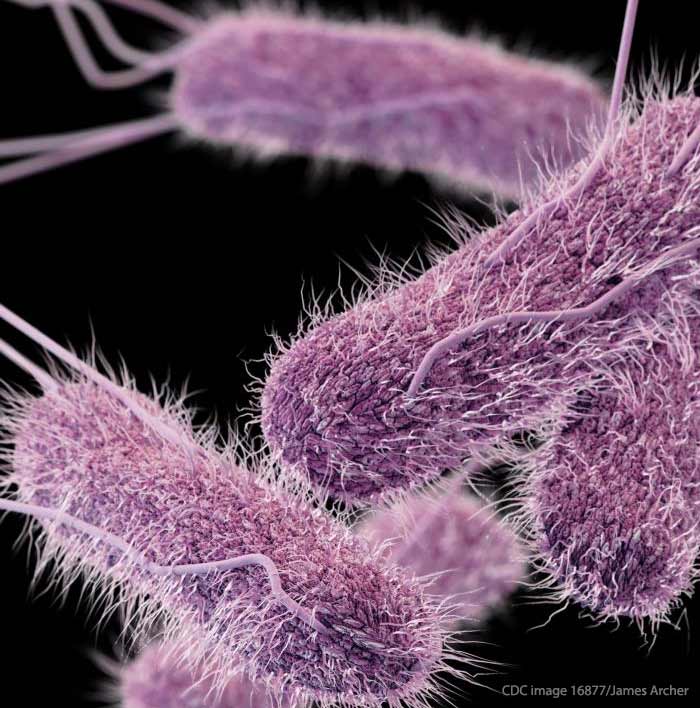The Maricopa County Department of Public Health has released a PDF report on their investigation into a Salmonella Javiana outbreak that sickened at least 50 people in July and August, 2016. There are 40 confirmed cases and 10 probable cases. Thirty-three (66%) of the cases reported eating at Restaurant A, with exposure dates from July 16 to August 18, 2016. Forty other restaurants or fast food establishments were reportedly patronized by patients. Three had more than one person reporting eating there within the week before illness onset with two cases each.

Findings from the investigation did not reveal a single source of contamination, but unfried shrimp was suspected as a possible vehicle for contamination based on a case control investigation. Environmental samples were taken. Several pre-portioned, prepped samples of seafood (shrimp and halibut) tested positive for Salmonella Javiana. The investigation did not find an unopened source product contaminated with the outbreak strain.
The timeline for this outbreak is complicated. On August 10, 2016, Maricopa County was notified by the University of Arizona Student Aid for Field Epidemiology Response Team of two unique culture-confirmed Salmonella cases who reported eating at Restaurant A. Then, an environmental assessment of the restaurant was conducted with no major violations. The restaurant enhanced their sanitizing protocol and performed deep cleaning.
On August 15, 2016, the Arizona Department of Health Services notified Maricopa County of a cluster of five Salmonella Javiana cases; three ate at Restaurant A. Six clinical samples on August 16, 2016 yielded Salmonella Javiana with the same PFGE patterns. On August 18, detailed food information from questionnaires was collected.
On August 24, 2016, ingredient information was received and compiled. On August 25, six more cases had PFGE patterns identical or very similar to the outbreak strain. On August 26, food samples were collected from the restaurant, as well as environmental samples.
On August 30, 2016, the freezer door handle sample and prepped re-packaged halibut samples tested “presumptive positive” for Salmonella. All other samples were negative.
On September 1, 2016, government officials gathered more foods from Restaurant A: 6 types of frozen unopened shrimp boxes, an unopened box of halibut, and eight different prepped/re-packaged shrimp samples. Also on September 1, contact information for dining companions was gathered for a case control study.
On September 2, 2016, the freezer door handle and repackaged halibut samples were serotyped as Salmonella Javiana. Five of six prepped/re-packaged shrimp samples were presumptive positive for Salmonella. On September 3, one unopened box of frozen U10 shrimp tested positive for Salmonella. Trackback began on the frozen shrimp.
On September 7, 2016, the freezer door handle environmental sample and the repackaged halibut sample came back as matching the outbreak strain of Salmonella Javiana. The frozen unopened box of U10 shrimp were serotyped as Salmonella Weltevreden and the 5 re-packaged shrimp were serotyped as Salmonella Javiana. The five prepped/re-packaged shrimp all match the outbreak PFGE pattern of Salmonella Javiana.
FDA traced the frozen U10 shrimp on September 13 and started working with the distributor to recall the product. The Maricopa County press release was given to the public since the product was sold to wholesalers instead of retail food establishments, but there was a recall of Censea frozen shrimp issued on September 22, 2016 posted on the FDA site.
On September 14, 2016, officials performed a routine inspection of Restaurant A with no violations. On the 15th, CDC returned the whole genome sequencing (WGS) of the four case patient isolates and they were all highly related. This means they likely originated from the same source.
The investigation was closed on October 3, 2016 with no more reports of illness or complaints. In the investigation analysis, the unfried shrimp was the only food item of “significance.” The specific source of exposure is “uncertain” according to the report.
The report states, “it seems likely that this outbreak resulted from initial contamination of a food product and continued via cross-contamination at the restaurant during food preparation.” It continues, “the findings of Restaurant A inspections demonstrated that seafood items were cooked according to the Arizona food code, however due to contamination with a high burden of Salmonella, unfried seafood might have been the vehicle of Salmonella infection.”
The law firm of Pritzker Hageman has filed a lawsuit against a restaurant in Phoenix, Arizona on behalf of a client who was sickened with a Salmonella infection. Their client ate tilapia, shrimp, and crab cakes, got sick, and was hospitalized for days in severe pain.




